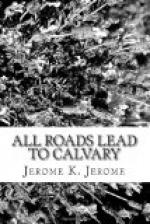She saw the ditches, like long graves dug for the living, where the weary, listless men stood knee-deep in mud, hoping for wounds that would relieve them from the ghastly monotony of their existence; the holes of muddy water where the dead things lay, to which they crept out in the night to wash a little of the filth from their clammy bodies and their stinking clothes; the holes dug out of the mud in which they ate and slept and lived year after year: till brain and heart and soul seemed to have died out of them, and they remembered with an effort that they once were men.
* * * * *
After a time, the care of the convalescents passed almost entirely into Joan’s hands, Madame Lelanne being told off to assist her. By dint of much persistence she had succeeded in getting the leaky roof repaired, and in place of the smoky stove that had long been her despair she had one night procured a fine calorifere by the simple process of stealing it. Madame Lelanne had heard about it from the gossips. It had been brought to a lonely house at the end of the village by a major of engineers. He had returned to the trenches the day before, and the place for the time being was empty. The thieves were never discovered. The sentry was positive that no one had passed him but two women, one of them carrying a baby. Madame Lelanne had dressed it up in a child’s cloak and hood, and had carried it in her arms. As it must have weighed nearly a couple of hundred-weight suspicion had not attached to them.
Space did not allow of any separation; broken Frenchmen and broken Germans would often lie side by side. Joan would wonder, with a grim smile to herself, what the patriotic Press of the different countries would have thought had they been there to have overheard the conversations. Neither France nor Germany appeared to be the enemy, but a thing called “They,” a mysterious power that worked its will upon them both from a place they always spoke of as “Back there.” One day the talk fell on courage. A young French soldier was holding forth when Joan entered the hut.
“It makes me laugh,” he was saying, “all this newspaper talk. Every nation, properly led, fights bravely. It is the male instinct. Women go into hysterics about it, because it has not been given them. I have the Croix de Guerre with all three leaves, and I haven’t half the courage of my dog, who weighs twelve kilos, and would face a regiment by himself. Why, a game cock has got more than the best of us. It’s the man who doesn’t think, who can’t think, who has the most courage—who imagines nothing, but just goes forward with his head down, like a bull. There is, of course, a real courage. When you are by yourself, and have to do something in cold blood. But the courage required for rushing forward, shouting and yelling with a lot of other fellows—why, it would take a hundred times more pluck to turn back.”
“They know that,” chimed in the man lying next to him; “or they would not drug us. Why, when we stormed La Haye I knew nothing until an ugly-looking German spat a pint of blood into my face and woke me up.”




